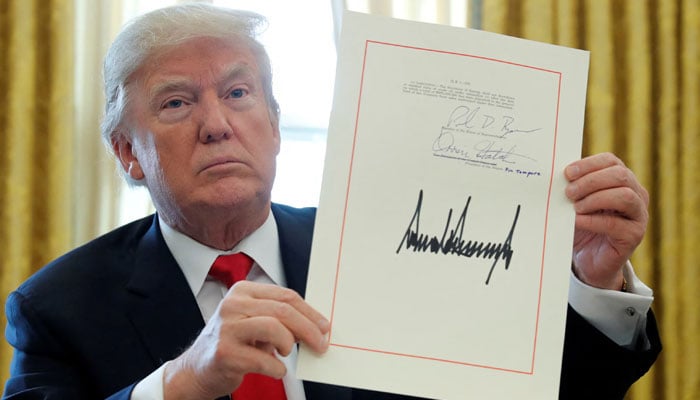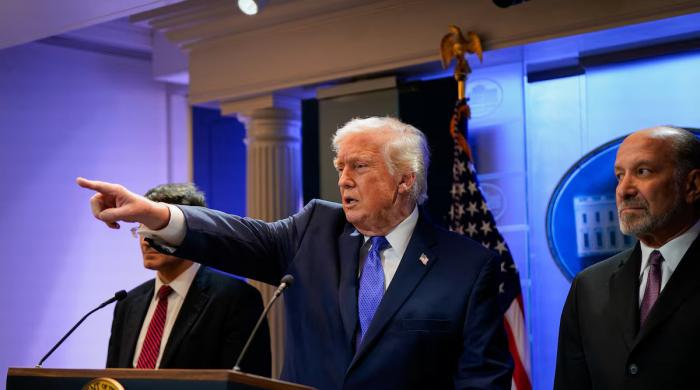Trump pushes Congress to pass his 'big beautiful bill' as debate clouds path forward
Republicans race to get legislation cleared before July 4, despite trillions in added debt
June 25, 2025

President Donald Trump urged fellow Republicans in the US Senate on Tuesday to advance his sweeping tax-cut and spending bill, as party hardliners and moderates squabbled over proposed spending cuts.
Republican leaders are pushing to get what Trump calls his One Big Beautiful Bill Act through Congress and to his desk before the July 4 Independence Day holiday. The bill would add trillions to the $36.2 trillion national debt.
Senate Republicans are at odds over the bill's details. Some want to make fewer cuts to social programs, including Medicaid healthcare for lower-income Americans, while hardliners want deep spending cuts to limit the growth of the federal deficit.
Some lawmakers have said it could take until August to pass the bill.
"This rural hospital thing is really becoming a drag," Republican Senator Josh Hawley of Missouri told reporters. He was referring to provisions that rural hospitals fear would reduce their funding and perhaps cause some to cease operations.
Republican Senator Thom Tillis of North Carolina, who faces a potentially difficult 2026 reelection campaign, told reporters that a possible proposal to create a $100 billion rural hospital fund wouldn't be enough to keep those facilities fully operating.
Another influential Republican, Senator Susan Collins of Maine, who is also up for reelection next year, told reporters she still has concerns about the bill's funding for Medicaid generally.
"To my friends in the Senate, lock yourself in a room if you must, don't go home, and GET THE DEAL DONE THIS WEEK. Work with the House so they can pick it up, and pass it, IMMEDIATELY. NO ONE GOES ON VACATION UNTIL IT'S DONE," Trump said in a post on social media.
Treasury Secretary Scott Bessent, who attended a Senate Republican lunch on Tuesday, said afterwards that Congress was on track to meet the July 4 deadline.
"I am confident that what the Senate passes over to the House will move through the House very quickly," Bessent said.
The emerging Senate legislation would extend expiring provisions of Trump's 2017 tax cuts, fund his crackdown on immigration and boost military spending.
The Senate bill would also raise the federal debt ceiling by another $5 trillion, adding pressure for action as the government heads toward an "X date" for a potentially catastrophic default this summer.
"We're getting close to the warning track," Bessent told reporters.
'Debt buster'
The version passed last month by the House of Representatives could increase the federal deficit by at least $2.8 trillion, despite a boost in economic activity, the nonpartisan Congressional Budget Office said last week.
Independent analysts predict the Senate version would cost more.
"Republicans know their plan is a debt buster but they don't seem to care," Senate Democratic leader Chuck Schumer of New York told reporters. "They're actually putting this country in the debt with the tax cuts," he added. "They know that."
Senate Majority Leader John Thune has said his chamber is on track to pass the bill this week. House Speaker Mike Johnson said his chamber would then take the legislation up quickly. Republicans control both houses of Congress.
"Hopefully, when push comes to shove and everybody has to say 'yes' or 'no,' we'll get the number of votes that we need," said Thune, citing the legislation's sweeping number of Republican priorities.
The debate has been compounded by a string of opinions from the nonpartisan Senate parliamentarian, who is ruling on what elements of the bill comply with the procedure Republicans are using to bypass the Senate's 60-vote filibuster. The bill cannot pass without bypassing the filibuster because solid opposition by Senate Democrats will not allow it to garner 60 votes in the 100-seat Senate.
The parliamentarian has blocked provisions that would cut spending for financial watchdogs, allow offshore gas and oil projects to skirt environmental reviews and glean savings from food assistance programs for the poor and the elimination of green tax credits.
Those decisions have caused alarm among House Republican hardliners, who could block the legislation if it returns to their chamber with those provisions absent.
"It looks to me like the parliamentarian is killing the bill. She's taking out all of the conservative spending cuts that we very carefully, with a razor's edge, passed in the House," said Representative Keith Self, a prominent hardliner.
Thune has repeatedly ruled out the possibility of overruling the parliamentarian, whose role is widely viewed by lawmakers as vital to the integrity of the Senate.
But Republicans have been able to win the parliamentarian's approval by revising the language of some previously blocked provisions.











